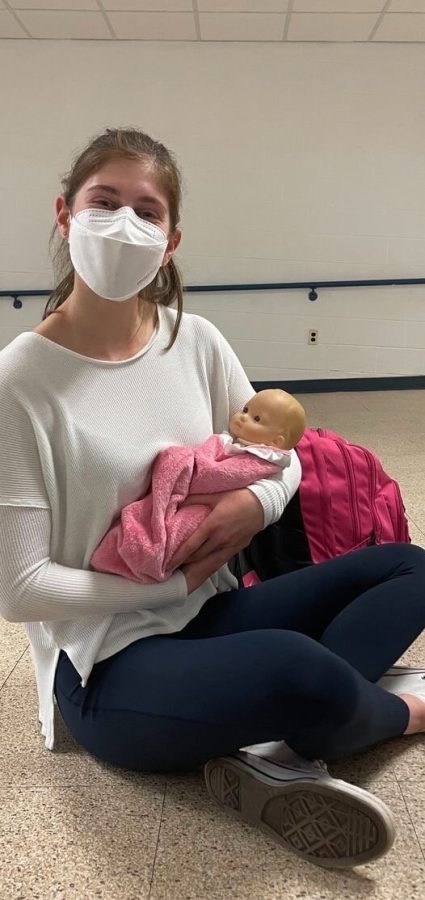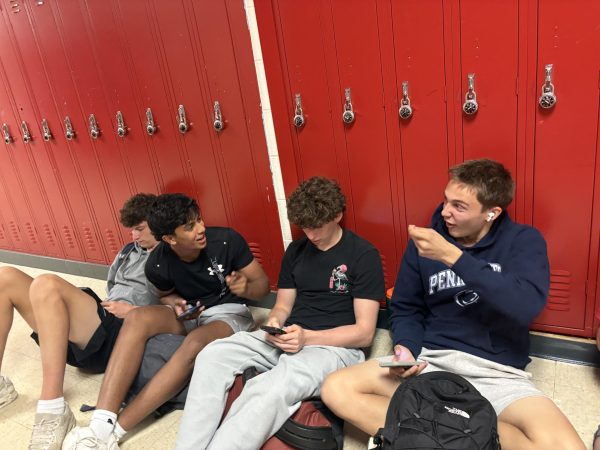Sociology baby unit reflects hardships, toils of family life
Photo courtesy Hannah Eisenfeld
Senior Hannah Eisenfeld cradles the baby doll that she was assigned to watch over throughout the school day.
Recently, students in sociology classes were assigned to watch over baby dolls in their annual baby unit. In the innumerable halls and corridors of the school, students could be observed carrying said dolls with them in between classes. For the assignment, students were assigned partners who they would ‘marry’ in this simulation.
Before the marriage aspect of the simulation, students determined their careers for the simulation, the amount of college debt depending on that career, and their budget. “The biggest takeaway for the kids is meant to be a sense of responsibility and understanding how marriage and the family sociologically gets applied and shows up in society,” sociology teacher Amy Buckingham said.
Supplementally, the students filled out journals, made adjustments to budgets and did other self-reflections. In total, the unit lasted between two to three weeks, with the actual baby dolls being involved for only one week.
This unit places emphasis on the practical matters of marriage, grounding students in the processes of marriage, divorce and childcare. “I want them to see the struggles of working with another person and that marriage is not all about the Disney view, [which is] happily ever after,” Buckingham said.
As for the students, bearing such responsibilities resulted in significant challenges, such as the influence of their peers, which caused them to have to be more conscious of their self-reliance and accountability. “My biggest challenge was dealing with my friends making fun of me for being an NBA G-League player with low pay and really good benefits,” senior Richard Black said.
There were specific ways in which the students practiced keeping the dolls “safe” during classes. The most prevalent method was to put the dolls within the attached compartment beneath the desks. This allowed for the students to not have to cause distractions for others around them.
Although the practical applications of this unit were immense, it seemed to reinforce previously acquired knowledge of the real world for students. “I didn’t find anything useful to take away. [I] just found it very fun,” Black said.
However, others learned from the copious communication that was necessary in order to effectively manage the different tasks associated with their family’s life. “The biggest takeaway[s] from the unit [are] cooperation and collaboration. Each couple had to ensure that they were working together to complete assignments and larger life events that would affect their marriage,” senior Hannah Eisenfeld said.
Furthermore, bearing the burden of carrying around the doll during the school day proved to be difficult in conjunction with their backpacks and other supplies. “I think the biggest struggle for students was remembering to take their baby to each class and to and from school, as funny and terrible as that sounds. Oftentimes students would forget their baby in one of their class[es] and have to go back to retrieve it,” Eisenfeld said.
In the end, the aim to educate students about the wealth of responsibilities and critical life decisions that accompany having a family remained central. Moreover, the students were able to learn first-hand how laborious maintaining a family is. “I want[ed] them to get bored, [but] I [didn’t] want them to be unproductive,” Buckingham said.
Your donation will support the student journalists of Thomas S. Wootton High School. Your contribution will allow us to purchase equipment and cover our annual website hosting costs.
Carter Jones is a 2022 graduate.







